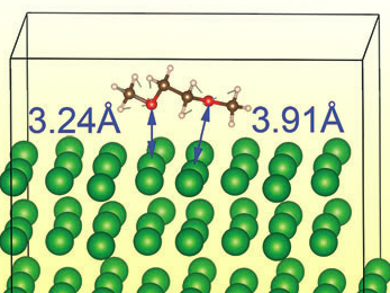Potassium-ion batteries are a promising battery technology due to the abundance of potassium and the low redox potential of K+/K in comparison with the commonly used lithium. However, electrode materials that can accommodate the large potassium ions with high reversibility are still needed.
Fujun Li, Nankai University, Tianjin, China, and colleagues have developed a safe and high-reversible bismuth anode for potassium-ion batteries with a dimethoxyethane (DME)-based electrolyte. The Bi is gradually developed into a three-dimensional porous network in cycles, in contrast to the alloying/dealloying reaction that impairs performance in other systems. This porous network is formed by the bismuth surface atoms interacting with DME molecules (pictured). The material can deliver a remarkable capacity of about 400 mAh/g and a long lifespan
A potassium-ion battery with Prussian blue as the cathode and bismuth as the anode showed a high energy density of 108.1 Wh/kg and good stability. According to the researchers, this emerging battery technology is promising for applications in large-scale electric energy storage.
- A Porous Network of Bismuth Used as the Anode Material for High-Energy-Density Potassium-Ion Batteries,
Kaixiang Lei, Chenchen Wang, Luojia Liu, Yuwen Luo, Chaonan Mu, Fujun Li, Jun Chen,
Angew. Chem. Int. Ed. 2018.
https://doi.org/10.1002/anie.201801389




